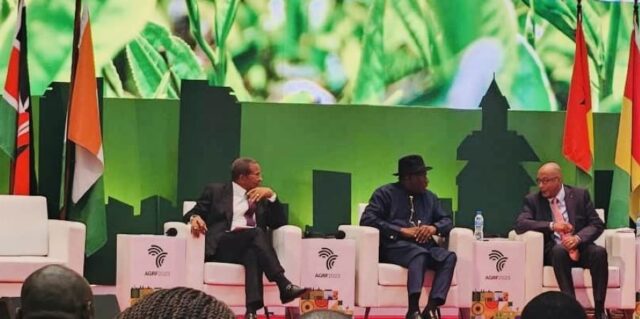WED SEPT 04 2024-theGBJournal| Former President Dr. Goodluck Ebele Jonathan has advised African leaders to prioritise innovation and technology as a means of achieving the four pillars of food security and making considerable progress in the fight against hunger and malnutrition on the continent.
Dr. Jonathan stated this on Wednesday in Kigali, Rwanda at the ongoing Africa Food Systems Forum 2024 while presenting his keynote speech at a session that focused on food systems and nutrition.
The former President who acknowledged the efforts being made by African countries and the African Union in the drive to achieve food security however noted that more needs to be done to realise the four pillars including food availability, access, utilisation and stability which are being promoted by the United Nations’ Food and Agriculture Organisation (FAO) in line with its goals for sustainable agriculture.
His word: “The integration of technology into agriculture to modernise farming in Africa is crucial to the desired transformative change needed to improve agri-food systems. This element should be a cornerstone of our strategy as we tackle the menace of hunger and malnutrition.”
The former President further charged the African Union (AU) to accord the issue of food security the same prominence being received by climate change, urging the leaders to appoint a serving president who would serve as the leading voice for agricultural reforms on the continent.
Similarly, Dr. Jonathan also advised African universities to intensify research in the areas of agricultural innovation, food processing and preservation.
Speaking on the state of nutrition in Africa, the former President said: “While notable progress has also been seen in improved nutrition, we are still faced with about 30% of children suffering from stunting resulting from malnutrition. Anaemia levels are still high among women and well above the global average estimate. A United Nations report indicates that the majority of Africans (over 70%) cannot afford healthy diets compared to 40% for the global average.”
As a way out, he urged leaders to show more commitment towards transforming the continent’s food system to ensure food sovereignty, by paying more attention to the imperative of political stability, peace and overall security”.
He stated: “It would be difficult to attain food sufficiency amid wanton insecurity and hostilities in our communities. Insecurity has negatively impacted farming activities as well as the marketing of food and other agricultural goods. This underscores why good governance, peace and security are critical to a transformed food system on our continent.
“We need to make more investments in the areas of agricultural extension, especially in the application of technology to increase yield, improve irrigation, boost all-year round farming as against rain-fed agriculture.”
Sharing his experience as Nigeria’s President from 2010 to 2015, Dr. Jonathan noted that his administration launched Nigeria’s Agricultural Transformation Agenda (ATA) in 2011 “to unlock the country’s huge agricultural potentials and accelerate production of local staples, to make food widely available and affordable, and to reduce dependence on food imports.”
He added that his administration also launched a major programme to turn agriculture into a business by attracting the youth into the sector. “We called them “Nagro-preneurs”… We provided the youth with access to technical and business skills, land, technologies, as well as finance”, he stated.
X-@theGBJournal|Facebook-the Government and Business Journal|email:gbj@govbusinessjournal.com|govandbusinessj@gmail.com










